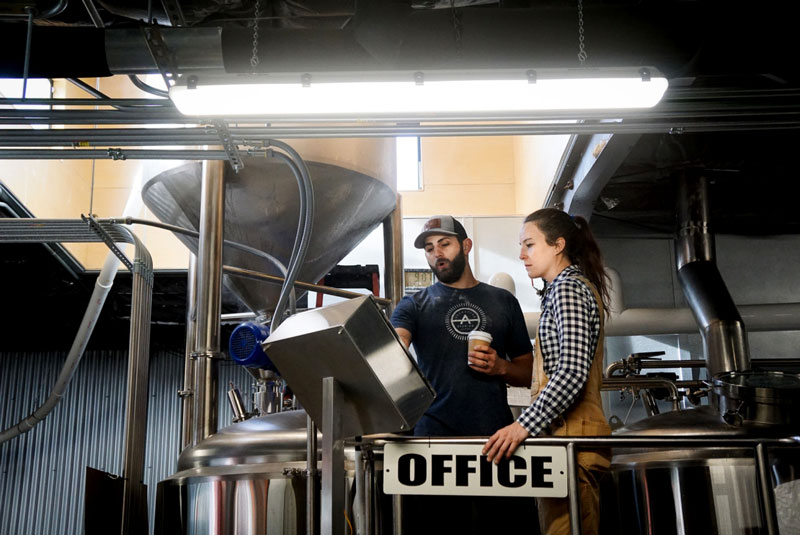Water. It gives us life. We need it, want it and desire it. We play in it and fear it. It quenches our thirst, cools us down and rejuvenates us. More importantly, it gives us beer.
[newsletter_signup_box]
Asheville, North Carolina, is home to arguably the third oldest river in the world, the French Broad River. The city ranks first in the highest amount of craft breweries per capita, according to Yahoo Finance – and it’s also leading the way when it comes to the people that care about its water. But it hasn’t always been that way.
From Dump Site to Destination
Before Asheville and the French Broad River became the thriving destination community it is today, there were years of neglect which turned the river’s banks into dump sites instead of nature sites. Age old industrial companies used its resources with no regard to future impact. Remnants of factory days long gone – twisted metal, rotting tires and decaying automobiles – made sure that this river was not a place of beauty.
In the late ‘70s and early ‘80s, after the federal government first began enforcing clean air and water acts, one of the earliest entities to focus on the river, the French Broad River Foundation, merged into what is now RiverLink. This nonprofit solely focuses on the conservation of the French Broad River and its watershed. RiverLink’s founding director, Karen Cragnolin, didn’t even know there was a river in Asheville when she first arrived here in the mid-1980s. The river was not a destination. In fact, Asheville historian Dr. Milton Ready called it “Asheville’s answer to Bangladesh — the poorest, most forgotten and neglected part of our city.”
With the help of these groups and others, an ever-increasing collaborative population, and a burgeoning art and brewing community rising up along her banks, the French Broad is no longer seen as the ugly duckling. Her beauty entwined its way into the soul of a new Asheville, the one we have come to know and love today.
(TRAVEL: Plan Your Next Beercation)
Zillicoah Taps into History

The booming economy of craft breweries is taking full advantage of the river and its value. One of those breweries, Zillicoah, specializing in open-fermented farmhouse ales and lagers, understands how her care impacts the economy. Located north of town, Zillicoah utilizes the river well. As tourists float down the French Broad’s swells, patrons at Zillicoah enjoy entertainment and views at an outdoor space right on the river’s banks.
Sipping on a smoked helles lager, Helles on Fire, I found myself at the bar chatting up the beertender, curious about the name Zillicoah. Right next to me was a friendly history buff, Les Reker. Director at the Rural Heritage Museum in Mars Hill, just outside of Asheville, he graciously took over the conversation. Expecting a brief explanation, I was thrilled to get a comprehensive history lesson of the French Broad and her environment.
“When the Cherokee arrived, [the French Broad] was already ancient,” Reker says. “It will always be here. Except for the impact of increased tourism, a mere 10 or 20 years of breweries have not had a significant impact on the French Broad River itself, in the great scheme of things, compared to all of the industrial plants that used to be located right along its shores.”
The Cherokees called this sacred expanse of water above Asheville “Zillicoah.”
“The river, or ‘Long Man,’ was always believed to be sacred, and the practice of ‘going to water’ for purification and other ceremonies was at one time very common,” Reker says.
(VISIT: Find a U.S. Brewery)
Brewing for the Broad
Keeping in line with RiverLink and Cherokee traditions to conserve the beauty of the area, New Belgium has joined forces with conservation companies and policy efforts such as Beverage Industry Environmental Roundtable, Brewers for Clean Water and the Natural Resources Defense Council and American Sustainable Business Council, to name a few.
Sierra Nevada’s Mills River location not only teamed up with RiverLink throughout the initial building process, but they continue to conserve water and work at keeping it clean through several methods, including using permeable pavers, onsite wastewater treatment and rainwater cisterns. These tactics, along with many more, helped Sierra Nevada become the first production brewery to earn a platinum certification for Leadership in Energy and Environmental Design (LEED) in 2016.
Oskar Blues has been focused on conservation since day one when they canned their first craft brew in 2002. They continue to be leaders today by utilizing tools to lower their beer to water ratio along with working with local farmers to address the large amounts of wastewater that naturally occurs with brewing.

Sally Tanner, marketing guru at Archetype Brewing, where their focus lies in yeast, experimentation and open fermentation, is excited to see where these breweries can take Asheville. “The saturation works for us in that people visit Asheville on ‘beer vacations.’” There’s also a lot of sharing of resources between breweries. Archetype, along with Twin Leaf Brewing, will also be teaming up with Climate City Expo, which highlights climate solutions and business opportunities, by brewing a beer with a focus on water quality.
Collaboration and community go hand in hand when it comes to craft breweries. It is nothing different when it comes to the people that tirelessly work to keep the French Broad something of value, including Hartwell Carson, the French Broad RiverKeeper working with MountainTrue, a local conservation organization. The 2019 French Broad Riverkeeper Beer Series is in the works and will include several breweries releasing special brews (to be announced soon) along with a community-wide river cleanup.
(READ: Sustainable Brewing in the Heart of Wine Country)
The Future of the French Broad
It doesn’t stop with cleaning up the river – there is another plan in the works to connect the French Broad with its community. An in-stream wave park is planned for the French Broad as part of a collaborative project between RiverLink and Woodfin Greenway and Blueway Project.
Over the river and through the woods, we found ourselves at Twin Leaf Brewery on Asheville’s South Slope, a small brewery that boasts beers such as a black tea saison and an oatmeal cookie brown ale. Owner and head brewer Tim Weber had a few thoughts on the plans for these French Broad.
“I think the wave park is going to really help the area,” he said. “The more [the river] is cleaned up and the more green space will also help bring in more folks.”
The practice of building community through craft beer is something to keep alive, and keeping Asheville’s French Broad River healthy is a pivotal part of the city’s magic.
CraftBeer.com is fully dedicated to small and independent U.S. breweries. We are published by the Brewers Association, the not-for-profit trade group dedicated to promoting and protecting America’s small and independent craft brewers. Stories and opinions shared on CraftBeer.com do not imply endorsement by or positions taken by the Brewers Association or its members.


Share Post